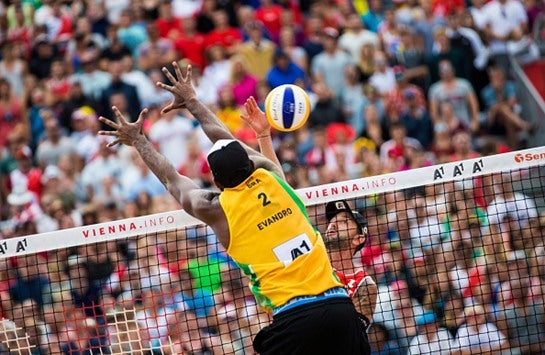
Last month, thousands of fans descended on Danube Island in
Vienna, Austria to watch the biennial FIVB Beach Volleyball World Championships.
As you would expect, the FIVB put on an enjoyable beach party.
The tournament introduced the use of new technology,
innovations and activations, part of a major commercial overhaul that the FIVB
hopes will eventually lead volleyball to join Group A of the International
Olympic Committee’s revenue distribution hierarchy (alongside athletics,
swimming and gymnastics).
Volleyball presently sits in Group B (alongside soccer,
cycling, basketball and tennis).
Since he was first elected in 2012, FIVB president Ary Graça has sought to increase volleyball’s global appeal to the IOC and to potential broadcasters and sponsors, initially through the launch of a nine-point plan in 2015.
We’re having lots of discussions and lots of companies are experiencing our product
The plan includes the addition of four new global sponsors
by the time of the Tokyo Olympic Games in 2020, contributing an additional $10
million per year in sponsorship revenue, and a doubling of the FIVB’s present
annual income of $31 million to $66 million by 2020.
How well do you really know your competitors?
Access the most comprehensive Company Profiles on the market, powered by GlobalData. Save hours of research. Gain competitive edge.

Thank you!
Your download email will arrive shortly
Not ready to buy yet? Download a free sample
We are confident about the unique quality of our Company Profiles. However, we want you to make the most beneficial decision for your business, so we offer a free sample that you can download by submitting the below form
By GlobalDataSpeaking at the championships in Austria, Fabio Azevedo says the federation aims to progress these plans by targeting certain territories.
“It’s going well,” he says. “We’re having lots of discussions and lots of companies are experiencing our product.”
“In terms of targets and strategy we want to move forward
and have a presence in the best markets in the world, based on the GDP ranking.
We want to be in USA, China, Germany, France and England. Those are the main
countries that we want to increase the presence of volleyball in. We are having
discussions with the US national volleyball federation about potentially taking
more events there.”

Like many other federations and sports properties, the FIVB
is eyeing up Asia as a future growth area for its sport. Azevedo says the
federation is “planning to have much more events in China, bring more companies
together and ensure we increase events.”
This year, the FIVB hosted one event in China, the World
Grand Prix 2017 Group 1 Final in Nanjing, but Azevedo claims that others will
be added in the region in the coming years, as the federation has begun to see
a significant uplift in its hosting fees.
He says: “What we are seeing is a very big improvement in
revenues from cities and countries hosting the event. That is increasing a
lot.”
Hosting fees for FIVB events in China have more than tripled
in the last three years, Azevedo says, despite overall annual income remaining
static.
The same uplift can also be seen in fees that the federation
is demanding from its Asian television rights-holders as “people want to pay
more for rights because we are improving the quality of our product.”
What we are seeing is a very big improvement in revenues from cities and countries hosting the event
The federation has acknowledged that, in order to command
higher fees and eventually lift income, the product must improve and interest
has to be sustained.
The FIVB’s ‘improved product’ includes the relaunch of its
traditional annual indoor volleyball league, the men’s World League and the
women’s World Grand Prix.
From 2018, a new 16-team promotion and regulation league
will launch for men’s and women’s international teams.
The competition will feature a second division and involve a
round-robin format but final details about the name and branding are yet to be
released.
The FIVB has said that the competition is part of plans “to
control content production and distribution… “to guarantee the quality and
consistency of events throughout the season.”
Azevedo explains: “Next year, we are going to launch a new
volleyball league that will be a completely new event. What we are doing is
that in every single match we are going to take control and make sure that it’s
visible on TV and ensure that we are in control.
“We are revolutionising our sport. Our sport is focused on
entertainment and we’re pushing our audience. Our expectation is that our audience
can really be engaged for every single point.”

The FIVB also hopes to sustain interest with the launch of
its own over-the-top platform in 2018.
Azevedo anticipates “that there will not be any exclusivity
any more,” so the FIVB’s intention is to launch its own OTT channel “selling
content directly to consumers” and “allowing fans to subscribe.”
He adds: “TV will continue but live streaming, Facebook and
our own OTT platform is a must for communication.”
Communication is a must for the federation, Azevedo stresses,
and an area in which it has perhaps failed in the past.
We are understanding more and more that we have to improve our communication
“We are understanding more and more that we have to improve
our communication regarding the special moments in our events and the players
as well,” he says.
“Why in beach volleyball do we not have worldwide heroes
yet? In beach volleyball we are not communicating properly. It’s as simple as
showing the face of our players. We are not doing that. We need to explore fan
engagement and make the most of our breaks in play to communicate.”
For Azevedo, Tokyo, where volleyball made its Olympics debut
at the 1964 Olympics, is the “perfect” opportunity for volleyball to present
itself as a ‘Group A’ sport.







